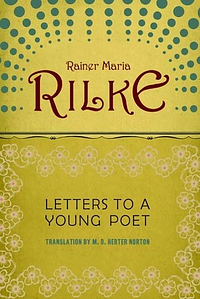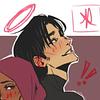Take a photo of a barcode or cover
inspiring
emotional
hopeful
inspiring
lighthearted
reflective
medium-paced
emotional
inspiring
reflective
fast-paced
i wish someone wrote letters like this to me fr. none of it really left that much of a mark on me but the earlier letters had useful advice to me as someone who writes.
inspiring
reflective
fast-paced
"and otherwise let life take its course. believe me: life is right, whatever happens."
In a hundred years a lot has changed and yet much remains the same. Rilke's letters to the eponymous Young Poet - one Mr. Kappus, who I frequently read as Mr Krappus, is a perfect lament to solitude and boredom. Where are the twin pressures of soul searching and careful deliberation that crystallises thoughts into gems of which this book is riddled? This 'review' may be a little over the top (as with a Simenon review from a few years back I can barely comprehend reading back) and take on a pretentious streak but I get carried away sometimes and other times I can't be arsed.
If I had highlighted the passages of intrigue the book would have taken on a vivid luminescence, insofar as it may as well have been printed on fluorescent paper to save me the bother. I was recommended this book by a fellow creative much more advanced in their career and it has been exactly the tonic for a troubled, restless, lost soul. I see these letters as a right of passage every young artist or creative should put at the top of their reading list. I love the author's view of life and setbacks and found his stoic philosophy of reframing failures as teachings and taking a long term approach like a tree branching out to be extremely comforting.
Having grown up as a religious person spending many years in Wales on Christian camps the brief intersections with theology did not discourage me but may put off some, however they do not detract from the message. In the context of Rilke's view that one should look to reconnect with the roots of our childhood from which we derive the most essential elements of our being it is certainly food for thought from a personal perspective.
As someone who had an abusive-violent father, abusive-violent babysitter, bullying neighbour child, punchbag to older brother, bullied throughout school and the youngest child helping a single parent with a brain injury I spent a lot of my youth in solitude, which is where my love of writing and reading originated. As such I can identify intimately with Mr Kra- sorry- Kappus' plight and the thoughtful letters of advice take on extra weight.
I bet Rilke would have been a huge fan of Jung's later work and of course Joseph Campbell the latter who's book concentrates on the Hero's Journey, a solitary undertaking in which one must embrace isolation and pain and educate oneself with a view to finding our true self. Having embarked on the journey myself I can attest that there is no predefined path and uncertainty, doubt and setbacks.
However 'Letters to a Young Poet' takes place over many years and we see Rilke's confidence in his young charge come to fruition. Rilke is very fond of trees and fruit as a metaphor and it is comforting to think that our endeavours to find meaning in our existence, who we really are and a fulfilling purpose are already ripening before the harvest.
It's hard to think that Twitter and Facebook discourses will be looked upon as essential reading in a hundred years so it is good that a man of letters such as Rilke has laid out this dialogue which will be useful the next thousand years. It's certainly a short read that I will revisit as needed, which won't be too long no doubt.
If I had highlighted the passages of intrigue the book would have taken on a vivid luminescence, insofar as it may as well have been printed on fluorescent paper to save me the bother. I was recommended this book by a fellow creative much more advanced in their career and it has been exactly the tonic for a troubled, restless, lost soul. I see these letters as a right of passage every young artist or creative should put at the top of their reading list. I love the author's view of life and setbacks and found his stoic philosophy of reframing failures as teachings and taking a long term approach like a tree branching out to be extremely comforting.
Having grown up as a religious person spending many years in Wales on Christian camps the brief intersections with theology did not discourage me but may put off some, however they do not detract from the message. In the context of Rilke's view that one should look to reconnect with the roots of our childhood from which we derive the most essential elements of our being it is certainly food for thought from a personal perspective.
As someone who had an abusive-violent father, abusive-violent babysitter, bullying neighbour child, punchbag to older brother, bullied throughout school and the youngest child helping a single parent with a brain injury I spent a lot of my youth in solitude, which is where my love of writing and reading originated. As such I can identify intimately with Mr Kra- sorry- Kappus' plight and the thoughtful letters of advice take on extra weight.
I bet Rilke would have been a huge fan of Jung's later work and of course Joseph Campbell the latter who's book concentrates on the Hero's Journey, a solitary undertaking in which one must embrace isolation and pain and educate oneself with a view to finding our true self. Having embarked on the journey myself I can attest that there is no predefined path and uncertainty, doubt and setbacks.
However 'Letters to a Young Poet' takes place over many years and we see Rilke's confidence in his young charge come to fruition. Rilke is very fond of trees and fruit as a metaphor and it is comforting to think that our endeavours to find meaning in our existence, who we really are and a fulfilling purpose are already ripening before the harvest.
It's hard to think that Twitter and Facebook discourses will be looked upon as essential reading in a hundred years so it is good that a man of letters such as Rilke has laid out this dialogue which will be useful the next thousand years. It's certainly a short read that I will revisit as needed, which won't be too long no doubt.
emotional
hopeful
informative
inspiring
fast-paced
If I had a friend willing to exchange letters with me in the manner Rilke did with Mr Kappus, displaying such an inordinate level of empathy and understanding, I think I’d fall in love.
reflective
slow-paced
emotional
inspiring
reflective
slow-paced




